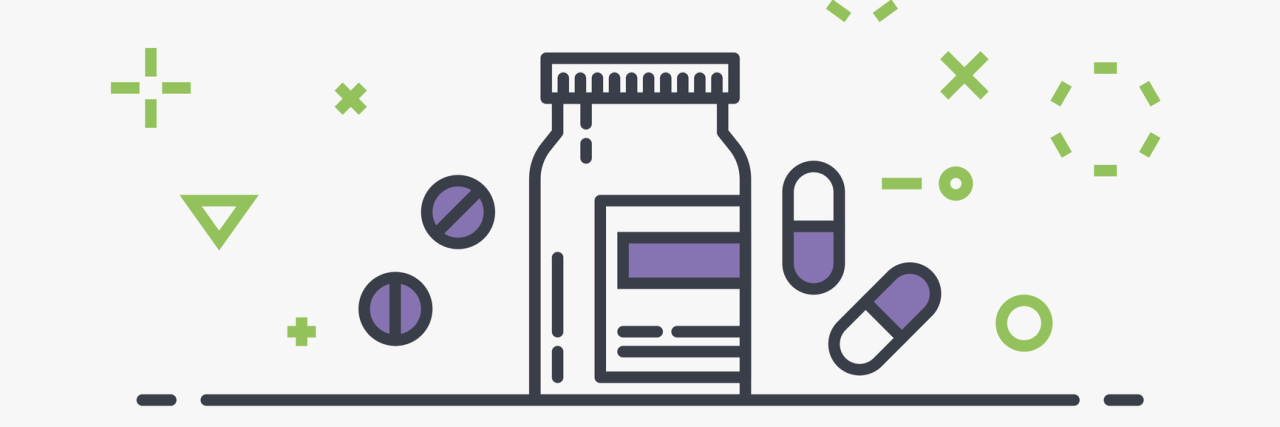No, My Antidepressants Are Not 'Crazy,' 'Happy' or 'Magic' Pills
Editor's Note
Please see a doctor before starting or stopping a medication.
Medication is medication and pills are pills, no matter what the illness. Medications for depression, anxiety, mood disorders, insomnia and other mental health conditions are just that: Medications for health conditions. They are not “crazy pills,” “happy pills” or “magic pills.”
“Crazy pills.”
If you have depression, you take antidepressants and it’s OK. But it’s not really OK, right? Even among healthcare workers, mental health care treatment is stigmatized. When I was about to transfer from the medical floor to the mental health clinic, a colleague said, “So, you are going to work with the ‘crazies,’ huh?” Internally, this made me frown because I thought: I am one of those “crazies.” This nurse was and still is a great nurse, I would have him care for everyone in my family, no question, but this is an example of something we need to overcome in mental health. Mental health patients aren’t “crazies” and they don’t take “crazy pills.” Using the word “crazy” in this context is incredibly demeaning and derogatory.
A person with a mental health condition isn’t “crazy.” Calling them that adds to their illness as they may spiral downward blaming themselves for their condition. I have been there, I know. Sometimes, it’s the hormones, biological receptors and neurological pathways inside them that create the illness. They didn’t choose it, it happened, and meds can help. Don’t fall into the myth medications for mental health disorders are “crazy pills.” They are prescription medications designed to help patients live better lives, just like other prescription medications.
“Happy pills.”
Raise your hand if someone in your family has said a family member is on “happy pills” now. Me. I don’t like antidepressants being called “happy pills” because it gives the false impression the person taking the pill should be beaming with joy, and that isn’t the case.
The truth is antidepressants don’t make a person happy. Antidepressants do help a person be less sad, more functional and sometimes more energetic, but they won’t suddenly be happy. The person takes the pill to achieve a mood that keeps them functioning in daily life, basically to attain what someone may think is a “normal” mood. As nice as it would be, a daily “normal” mood of a person without depression isn’t always happy. A typical mood may fluctuate in joy, sadness, contentment, irritation, etc.
Someone with depression often has difficulty getting past overwhelming sadness. The medication helps with this overwhelming sadness. With that said, the person taking antidepressants may find happiness with the help of pills, but not necessarily because of them.
“Magic pills.”
On the other hand, once patients do get past the stigma of getting treatment and come into the clinic, many of them want a “magic pill.” I don’t blame them. I want a magic pill for things, too. Magic pills just don’t exist though.
It can take four to six weeks for a person to achieve the full effect of an antidepressant. This is a very long time, especially when a person is at the brink of a crisis, which is why it is better to come sooner than later. Unfortunately, these weeks may pass and still it may not be the right medication for the person. They may have to start the trial all over with a different medication. There are genetic tests available that can help decide what medications might work better than others, but there is no way to really know what will work best for what person until trying. It’s unfortunate, but it’s the best science we have.
The gold standard of mental health treatment for certain disorders is to combine medication with therapy. If the pills aren’t magic and they take what can seem like forever to kick in, there should be another aid for healing. This aid is therapy. Just like our bodies need nutrition and exercise in combination with medication for physical healing, our minds and souls may need therapy in addition to medication for emotional healing. Some people may benefit from a few sessions, while some people may need therapy for life. Either way, it’s OK. It’s OK to take the meds we need and get the help we need.
In conclusion, pills are pills. Let’s change our vocabulary to improve the understanding of medication for mental health purposes by not describing these meds as “crazy,” “happy” or “magic pills.”
Getty image by IkonStudio

